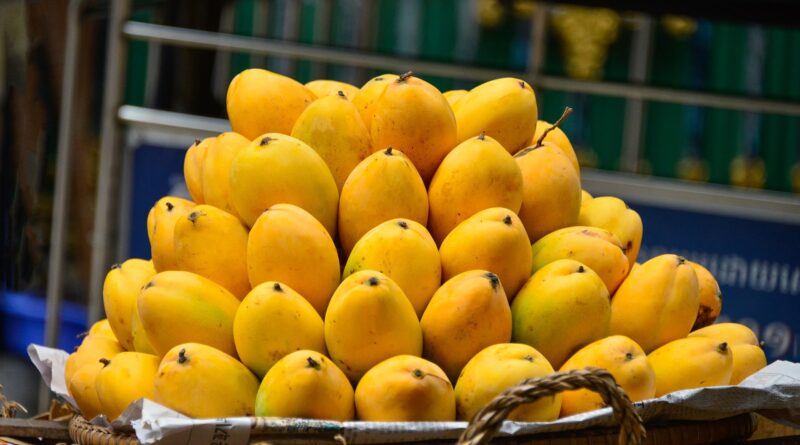Guide to Relish Mangoes – Dos, Don’ts, Benefits, and More
The summer season brings with it a bounty of delicious fruits, and one fruit that is eagerly awaited by many is the mango. Known as the “king of fruits,” mangoes are not only incredibly tasty but also packed with a host of health benefits. In this guide, we will explore everything you need to know about mangoes – from the different types available to the dos and don’ts of buying and storing them. So grab a juicy mango and let’s dive in!
Introduction
As the temperature rises and the days become longer, mangoes start appearing in abundance in markets and grocery stores. These vibrant and succulent fruits not only quench our thirst but also provide us with essential nutrients. In this article, we will explore the different types of mangoes, offer tips on buying and storing them, discuss their health benefits, and share some delightful ways to enjoy them.

The Different Types of Mangoes
Mangoes come in various shapes, sizes, and colors. Some popular mango varieties include Alphonso, Kent, Tommy Atkins, and Ataulfo. Each variety has its own unique taste, texture, and aroma. For example, Alphonso mangoes are known for their rich and creamy texture, while Kent mangoes are sweet and juicy. Exploring the different types of mangoes allows you to discover your personal favorite.
Dos and Don’ts of Buying Mangoes
When selecting mangoes, it’s important to know what to look for to ensure you pick the best ones. Choose mangoes that are slightly soft to the touch and have a fruity aroma at the stem end. Avoid mangoes with wrinkled skin or visible bruises. Additionally, check for any signs of mold or a sour smell. By following these dos and don’ts, you can bring home perfectly ripe and flavorful mangoes.
Storing Mangoes Properly
To enjoy mangoes at their best, it’s crucial to store them properly. Keep unripe mangoes at room temperature until they are ripe enough to eat. Once ripe, you can store them in the refrigerator to prolong their shelf life. It’s advisable to keep ripe mangoes separate from other fruits to prevent them from overripening. By following these storage guidelines, you can savor fresh mangoes for a longer duration.
Health Benefits of Mangoes
Apart from being a delectable treat, mangoes offer numerous health benefits. They are a rich source of vitamins, minerals, and antioxidants. Mangoes contain vitamin C, vitamin A, and dietary fiber, which support the immune system, promote healthy vision, and aid digestion. Additionally, the antioxidants present in mangoes help combat free radicals in the body, reducing the risk of chronic diseases.
Ways to Enjoy Mangoes
Mangoes are incredibly versatile and can be enjoyed in various ways. You can savor them as a standalone fruit, add them to salads, or blend them into smoothies. Mangoes also make excellent ingredients for desserts like mango ice cream, mango cheesecake, and mango pudding. For a refreshing beverage, you can make mango lassi or mango mojito. The possibilities are endless when it comes to relishing mangoes.
Mangoes and Weight Loss
Contrary to popular belief, mangoes can be a part of a weight loss diet when consumed in moderation. They are low in calories and fat, making them a healthier alternative to high-calorie snacks. However, portion control is key. Incorporating mangoes into a balanced diet while keeping an eye on overall calorie intake can support weight loss goals.
Mangoes and Skin Health
In addition to their delicious taste, mangoes can contribute to healthy and glowing skin. The high content of vitamins A and C in mangoes helps promote collagen production, which is essential for maintaining skin elasticity and reducing the appearance of wrinkles. You can even use mango pulp as a natural face mask to hydrate and rejuvenate your skin.
Potential Allergies and Side Effects
While mangoes offer numerous health benefits, some individuals may experience allergies or side effects. Mangoes belong to the same family as poison ivy and poison oak, so people with sensitivities to these plants may also be allergic to mangoes. Symptoms can range from mild skin irritation to more severe reactions. If you suspect an allergy, it’s best to consult a healthcare professional.
Conclusion
Mangoes are not only a delightful summer fruit but also a powerhouse of nutrition. From their various types and flavors to their potential health benefits, mangoes offer a wide range of reasons to enjoy them. Remember to select ripe mangoes, store them properly, and savor them in creative ways. So make the most of this mango season and indulge in this tropical delight!
FAQs
- Can mangoes help with digestion?
- Yes, mangoes are rich in dietary fiber, which aids digestion and promotes a healthy digestive system.
- How many calories are there in a mango?
- On average, a medium-sized mango contains around 150-200 calories.
- Can mangoes be frozen?
- Yes, mangoes can be frozen. Cut them into pieces and store them in a sealed container or freezer bag for future use.
- Are mangoes good for diabetic patients?
- While mangoes do contain natural sugars, they can be included in moderation as part of a balanced diabetic diet. It’s important to monitor blood sugar levels and consult a healthcare professional for personalized advice.
- Can mangoes be eaten during pregnancy?
- Yes, mangoes can be consumed during pregnancy. They are a good source of vitamins and minerals, but it’s important to wash them thoroughly and consume them in moderation.
Please Read –
90% People can Get rid of High Blood Pressure



